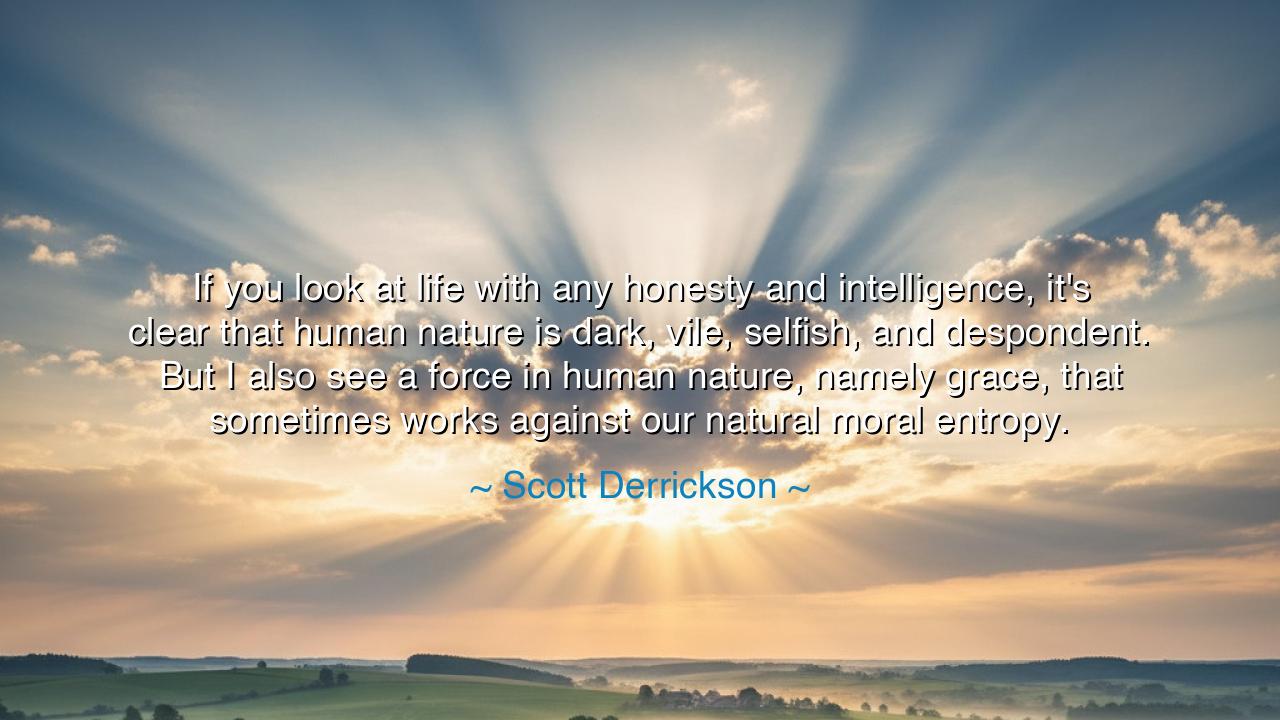
If you look at life with any honesty and intelligence, it's clear
If you look at life with any honesty and intelligence, it's clear that human nature is dark, vile, selfish, and despondent. But I also see a force in human nature, namely grace, that sometimes works against our natural moral entropy.






“If you look at life with any honesty and intelligence, it's clear that human nature is dark, vile, selfish, and despondent. But I also see a force in human nature, namely grace, that sometimes works against our natural moral entropy.” So speaks Scott Derrickson, the modern seer who peers into the heart of humankind and beholds both its abyss and its light. His words carry the weight of ages—the same truth the ancients whispered around their fires: that man is a creature of contradiction, half angel, half beast. Within the same breast burns the fire of selfish desire and the trembling spark of grace, forever at war for dominion over the soul.
To understand the fullness of this wisdom, one must first accept the darkness of human nature. History, that stern and unflinching mirror, shows us greed crowned as kingship, envy dressed as ambition, and cruelty disguised as justice. From Cain’s jealous hand that slew his brother, to empires that drowned nations in blood, humanity has always carried within it the seed of destruction. We are creatures drawn toward decay, toward moral entropy, for the spirit that was once whole is forever struggling against the slow rot of pride and desire. To deny this is to close one’s eyes to the shadow that follows every step we take.
And yet—grace. That word glows like a single candle in the blackest night. Grace is the mysterious force that bends the will back toward goodness, even when all reason suggests despair. It is not earned, nor commanded; it descends unbidden, like rain upon a scorched earth. It is the mother’s forgiveness of her prodigal child, the stranger’s hand reaching into danger to save another, the artist’s vision of beauty born from pain. Grace is what makes redemption possible, not as an act of logic, but as an act of divine rebellion against decay.
Consider the story of Oskar Schindler, a man who lived in an age of monstrous cruelty. He began as a profiteer—a man of ambition, indulgence, and self-interest. Yet, as the flames of the Holocaust consumed the world, something awakened within him: grace. At the risk of his fortune and his life, he saved over a thousand souls from death. This transformation was not born of ideology or gain, but of a sudden illumination of the heart, a defiance of moral entropy. In that act, the beast yielded to the angel. His story is proof that even amid the darkest evils, grace persists as a countercurrent to despair.
Derrickson’s insight reminds us that the struggle between depravity and grace is not fought once but daily, within every human heart. The ancient philosophers called this the war between the flesh and the spirit, between eros and agape, between chaos and order. It is not a battle to be won forever, but one to be waged continually. Every act of kindness, every forgiveness offered, every truth spoken in a world of lies is a small victory against the entropy of the soul.
Therefore, let us not curse humanity for its darkness, nor worship it for its light. Let us instead live with honesty and intelligence, as Derrickson commands, recognizing both the fall and the rising. To see only evil is to fall into despair; to see only good is to fall into delusion. The wise see both—and choose to fight for the better part of themselves, again and again, without end. Grace is the weapon by which we defy the inevitable decay of the spirit.
So, my children of the future, when you behold cruelty in the world—when you feel bitterness, envy, or hatred stirring in your heart—remember this: that darkness is your inheritance, but grace is your salvation. The former is easy; the latter must be chosen. Each time you forgive when wronged, give when unseen, or love when unloved, you rise above the dust from which you came. Let this be your practice: do not seek perfection, but seek grace—for it is the only force that redeems what is broken, the only light strong enough to hold back the night within.






AAdministratorAdministrator
Welcome, honored guests. Please leave a comment, we will respond soon